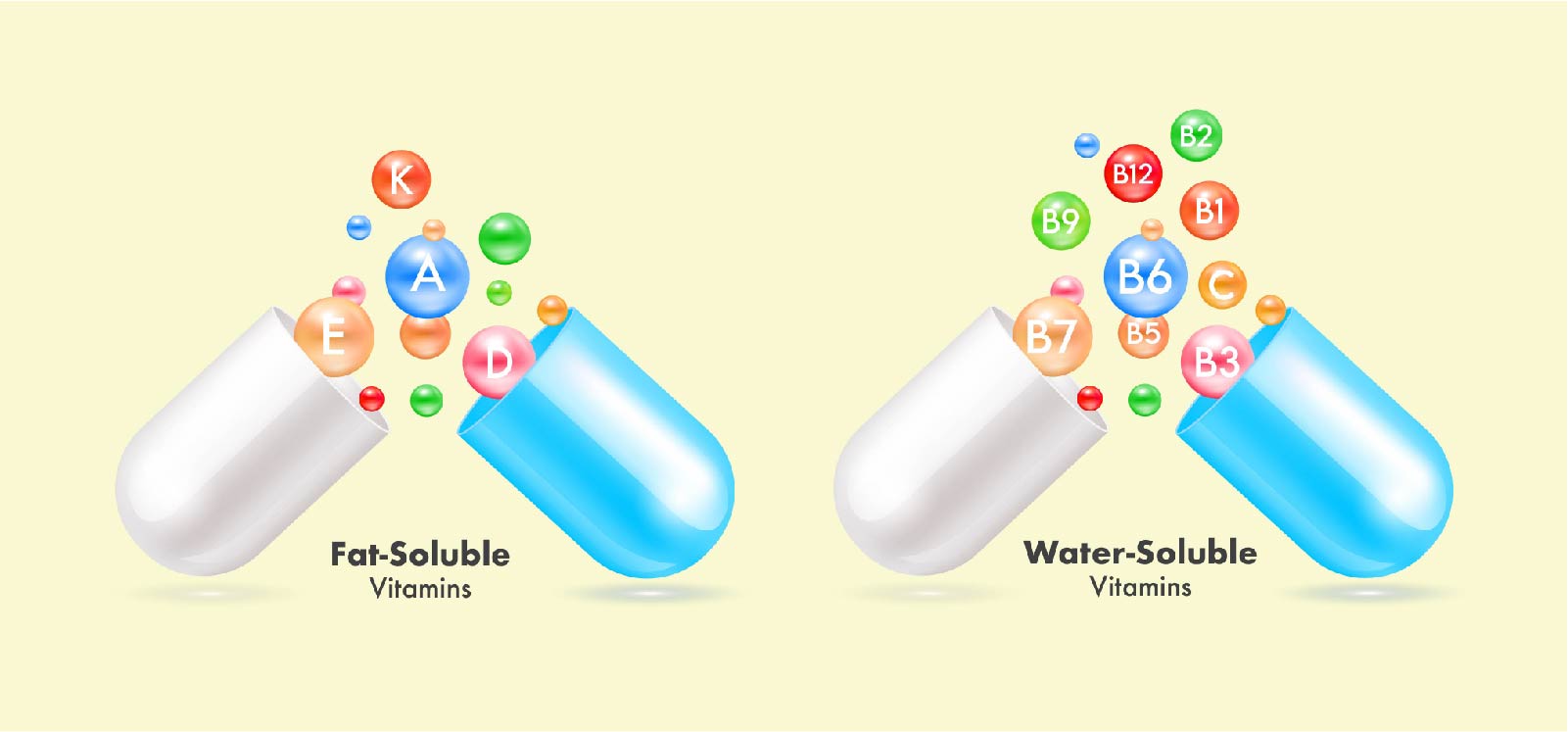Vitamins are essential micronutrients that play a crucial role in maintaining good health. They are classified into two primary categories: fat-soluble and water-soluble. As their names imply, fat-soluble vitamins are absorbed by dietary fat and water-soluble vitamins are dissolved in water. This key difference leads to their unique characteristics and storage capabilities in the body.
Fat-Soluble Vitamins
Four vitamins are considered fat-soluble: vitamins A, D, E and K. Fat-soluble vitamins are absorbed through the intestinal tract with the help of dietary fats, transported through the lymphatic system and released into the blood stream. Once absorbed, any fat-soluble vitamins not immediately needed by the body are stored in fat tissue or the liver. As additional amounts of these vitamins are needed, the body taps into the reserves, releasing them into the bloodstream from the liver.
Who may be at risk of deficiencies?
People who regularly eat a balanced diet with a variety of foods are unlikely to develop most vitamin deficiencies. However, vitamin D deficiency is very common among certain groups of people (such as older people) even if they eat a variety of foods. And because the absorption of fat-soluble vitamins depends on the absorption of fats from the GI tract, people suffering from malabsorption of lipids could suffer from deficiency or low levels of fat-soluble vitamins. Health conditions that interfere with normal digestion can lead to malabsorption; these include celiac disease, Crohn’s disease, chronic diarrhea, cirrhosis, alcoholism, cystic fibrosis and other pancreatic disorders. Those following a restricted diet or very low-fat diet may not provide the body with the required amount of fat needed to absorb enough fat-soluble vitamins.
Lack of or insufficient amounts of fat-soluble nutrients can cause a range of health concerns including night blindness, bone disorders, compromised immune function, hearing issues, skin complaints, neurological problems and increased susceptibility to oxidative stress. Also note that taking excessive amounts of these vitamins can lead to accumulation in tissues and cause toxicity over time since these vitamins aren’t easily excreted. Simple blood tests can help monitor vitamin levels in the body.
Important Roles and Dietary Sources of Fat Soluble Vitamins
Vitamin A is essential for vision, immune function, and skin health and can be found in fish oils, dairy products, beef liver and colorful fruits and vegetables. Vitamin D is crucial for calcium absorption, promoting bone health. It is synthesized by the skin in response to sunlight and is also found in fatty fish and fortified foods. Vitamin E acts as an antioxidant, protecting cells from oxidative damage, and E is present in nuts, seeds, vegetable oils, and leafy greens. Lastly, vitamin K is vital for blood clotting and bone metabolism, and this nutrient is found in green leafy vegetables, broccoli, and soybean oil.
Water-Soluble Vitamins
Unlike fat-soluble vitamins, water-soluble vitamins do not require dietary fats for absorption – rather, they are absorbed directly into the bloodstream via the small intestine. Water-soluble vitamins are not stored to a significant extent in the body and are excreted through urine if not used. As a result, regular intake is essential to prevent deficiencies.
Water-soluble vitamins include vitamin C and the vitamin B complex. Vitamin C plays a role in collagen synthesis, immune function, and antioxidant defense and is abundant in citrus fruits, strawberries, bell peppers, and leafy greens. B-complex vitamins (B1, B2, B3, B5, B6, B7, B9, B12) are involved in various metabolic processes, energy production, and nerve function and can be found in whole grains, meat, poultry, fish, dairy products and leafy greens. For more information on B vitamins, read ”What’s so Essential about B Vitamins.”
Ensuring the Body has Necessary Nutrients
The best way to prevent vitamin deficiencies is to eat a balanced diet that includes nutrient-dense fresh foods and healthy fats. Even if you go out of your way to eat a balanced diet, there may be some important vitamins and minerals that are slipping through the cracks—either the vitamin or mineral in question is only found in a few foods that you don’t typically eat, or it’s a nutrient that’s not properly absorbed by the body, perhaps because of health issues, medications, or age. Lifestyle factors including stress, medication, diet, caffeine, alcohol and even exercise may have negative effects on the absorption of nutrients. If the body can’t obtain enough from diet alone, supplementation is a practical solution.


